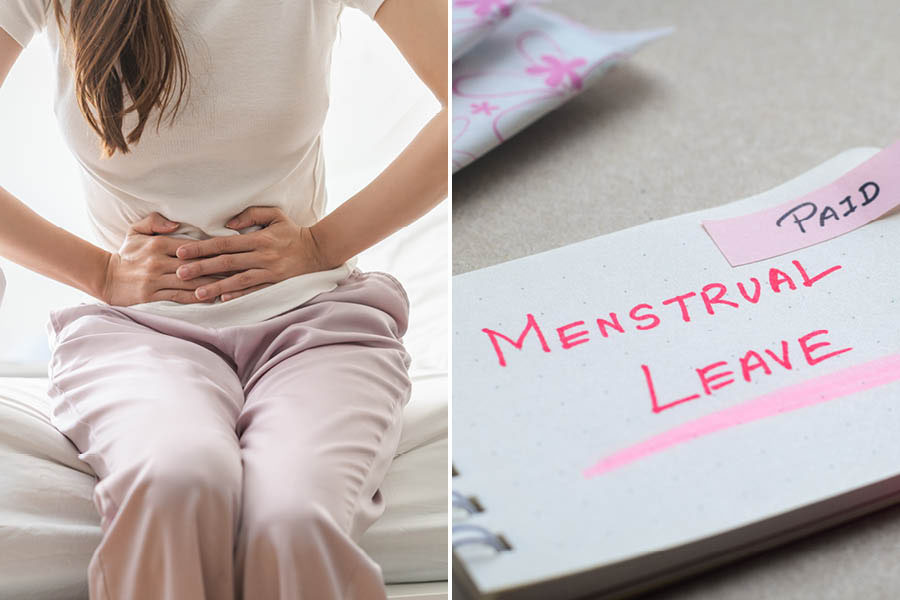Menstrual leave — essential support or potential setback? A Supreme Court bench, comprising Chief Justice DY Chandrachud and Justices J B Pardiwala and Manoj Misra, has urged the Centre to establish a model policy on period leave. This request has sparked a debate on whether period leave is necessary at all. The Supreme Court, while mentioning that menstrual leave might attract more women to the workforce, has expressed concerns that a court-mandated decision on such leave might be counterproductive by possibly discouraging employers from hiring women.
My Kolkata spoke to women from all walks of life who are carving their own niche in showbiz or corporate sectors, powering through strenuous hours in front of the camera, meeting deadlines and attending client meetings — all while braving their menstrual cycles. Know their take on period leave in the edited excerpts below…
‘Singling out women is not necessarily the answer. Instead, more liberal leave policies are needed’

Karishma Swarup is a sexuality educator My Kolkata Archives
I have mixed feelings about the period leave policy. On the one hand, it is a great move to make the workplace more accessible to women who menstruate, particularly those with conditions like endometriosis or PCOS, which are under-researched. The least we can do as a society is to give them the space to rest. However, from a purely capitalist employer lens, this policy might discourage employers from hiring women. They might prefer to hire men who work all 30 days a month instead of women who might work only 25 or 26 days a month for the same pay.
Singling out women is not necessarily the answer. Instead, more liberal leave policies are needed. Some new-age firms have tried things like making it mandatory to take a fixed number of days off per month or using up sick leaves within the year. This helps create equitable workplaces for women and for anyone who might need time off for other reasons like childcare, doctor visits or therapy sessions. Only with a structural shift to accommodate everyone will we create an environment where women are not spotlighted for taking period leave.
I had the privilege of working at a firm where you could use your sick leave as period leave without declaring the reason. However, we only got 10 sick leaves for the whole year. Even if I took one day off a month, it would fall short. While I appreciated the support, needing more days off would have been challenging. When I had female superiors, it felt comfortable to say, “Hey, I’m not feeling well because of my period and need time off,” but unfortunately, I don’t know if I would have felt the same comfort with my male superiors.
— Karishma Swarup, sexuality educator
‘Many things were considered normal until we corrected course and menstrual leave can be a part of the new system’
Actress and entrepreneur Chitrangada Satarupa @chitrangadasatarupa/Instagram
I am not sure if menstrual leave should be mandatory because many women are okay to work during their periods. However, for some women, the cramps can be really severe. I know some friends of mine who have actually fainted because they haven’t been able to bear the cramps! It’s true that when we are on our periods we don’t feel good all the time, but somehow we have gotten used to it over the years because it has been a part of our lives, our bodies. I think there should be space to have the option of giving women employees leave during their period.
From my perspective, it’s okay if it’s not mandatory. If somebody is okay to work during the periods, it’s absolutely fine. But for those who find the cramps unbearable, they should have the option to rest for a day or two. Different bodies function in different ways, and show different symptoms during their menstrual cycles.
In the past, many things were considered normal until we corrected course and established new norms, and this (menstrual leave) can be a part of the new system. I don’t think it will be detrimental for the career growth of women. If the companies believe in having more women in different departments, they can develop systems to offer optional leave to women employees.
— Chitrangada Satarupa, actress and entrepreneur
‘Adequate monitoring needed to check that women are not denied employment opportunities for menstruating’
Dyuti Banerjee is a chef and a teacher from Kolkata My Kolkata Archives
I believe period leave should be made mandatory by every employer or organisation without question, upon a woman’s request, considering the variability in women’s menstrual cycles and symptoms. There should be adequate monitoring to check that women are not arbitrarily denied employment opportunities for menstruating.
But I cannot accept the reasoning that mandatory period leave would be detrimental to the career growth of working women, or that companies would be wary of taking women on board. This belief perpetuates a toxic patriarchal mindset that prioritises workability and productivity over health and well-being, and if not, then survival of the fittest must take the ‘unfits’ out. I am sure we can work around the administrative technicalities and legalities if we really want true emancipation of women, keeping their interests foremost.
I personally have more or less smooth periods, however it’s not the same for everyone. At some of my previous workplaces, I have seen male and older female colleagues cast looks and comments of aspersion, “oof, or toh legei thake”, as though period cramps are something a woman could opt out of if she was serious about her work. Normalising working with that amount of pain, shows us as an unempathetic, inhumane society.
— Dyuti Banerjee, chef and teacher
‘Menstrual leave can ease the burden and help women balance home and work responsibilities’
Tollywood actress Parno Mittrah Instagram
Well, menstrual leave makes it easier for a woman during those few days of the month, because a woman’s body undergoes several changes, coupled with pain and uneasiness. It can ease the burden of an otherwise hectic schedule, helping women balance both home and work responsibilities.
— Parno Mittrah, actress
‘Mandatory menstrual leaves will make women feel more empowered to join the workforce’
For Devlina Kumar, dancer and actress, it’s a neutral idea Instagram
I think having period leave will encourage women because many women experience pain during this time of the month. Mandatory menstrual leaves will make women feel more empowered to participate in the workforce. For me, it’s a neutral idea because we all have to go to school, college, and then work. If we get leave, that’s a bonus. It’s good to treat periods as a normal thing, but if it causes pain, you should rest.
— Devlina Kumar, danseuse and actress
‘Granting period leave will foster a more inclusive, supportive work environment’
Lopamudra Bhattacharya, financial analyst, is in favour of period leave Instagram
Period leaves should be optional, allowing women to take them as needed. Employers need to be flexible, offering leave, work-from-home options, or reduced hours. Right now, I have to take sick leave during painful periods, but having periods is not an illness. This policy, or even just talking about it, acknowledges that menstruation can be tough for some women and supports their well-being. It will definitely foster a more inclusive and supportive work environment — ensuring women do not have to choose between their health and their professional responsibilities. I believe this change is crucial for promoting gender equity and inclusivity in workplaces.
— Lopamudra Bhattacharya, financial analyst
‘I worry that mandatory menstrual leaves will make employees like me seem like a liability’
Shaoni Rakshit is brand & marketing associate at PWC
As a woman who suffers from unpredictably painful menstrual cramps, having period leave would be very valuable to me. Such a policy is a crucial step towards truly including women in office spaces. However, working in the corporate sector, I worry that mandatory menstrual leave could make employees like me seem like a liability. Married women are often subject to discrimination at workplaces if they choose to be mothers. I fear a similar bias could affect all women if menstrual leave becomes mandatory.
I have never been offered any kind of period leave at any workplace. I have taken sick leaves when my cramps were too bad. Most of the time I haven’t specified the exact reason. However, whenever I have, I have been fortunate to be surrounded by colleagues, who understood my issue and did not diminish my pain.
— Shaoni Rakshit, brand an marketing associate
‘A nuanced understanding and wide-ranging consultations with industry experts are essential’
Sneha Roy is a sales executive
The Supreme Court’s directive on menstrual leave can be a double-edged sword for women in the workforce. It acknowledges women’s health challenges, potentially reducing stigma and making workplaces more inclusive — thus improving well-being and productivity by allowing rest during severe symptoms.
However, mandatory period leave might reinforce gender stereotypes, leading employers to view women as less reliable, which could hinder hiring, promotions and career growth. Women who have access to period leave report mixed experiences — while some find relief and productivity boosts in supportive cultures, others face stigma and discrimination.
Given this complexity, a nuanced understanding and wide-ranging consultations with industry experts are essential. Hopefully, the model policy yet to be framed by the Central Government can provide much-needed answers, balancing support for women’s health without compromising their careers.
— Sneha Roy, sales executive

